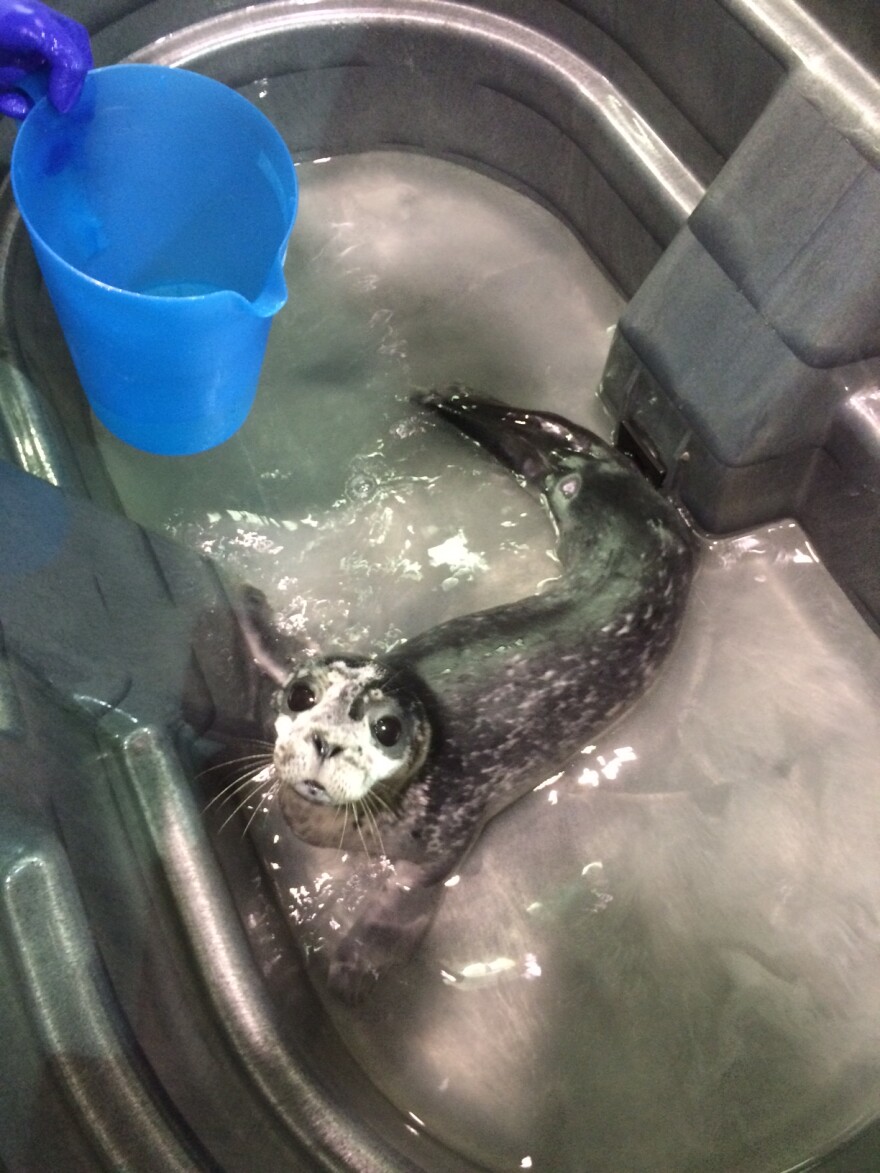If you head to the beach this weekend, and you might come across a razor clam, a crab or two, and maybe even a seal pup. Now’s the time of year when seal moms have babies, and they leave their pups on the beach while searching for food. But sometimes, the moms don’t come back. That’s when staff and volunteers from a new triage center in Harpswell come to the rescue.
The calls about abandoned pups start in April, as a trickle. But come Memorial Day weekend, says Lynda Doughty, the executive director of Marine Mammals of Maine, her triage facility l will kick into high gear.
“It literally is like a light switch that just gets flicked, and then everything is happening at once,” Doughty says.
Sure enough, the Friday before Memorial Day weekend, Doughty’s morning is soon interrupted by the arrival of a new harbor seal pup.
Renee and Bill Barthelman carry in a pup found on Scarborough beach. The Barthelmans are two of the 75 volunteers Marine Mammals of Maine rely on to help monitor and transport seals on beaches from Kittery to Rockland.
“Found her yesterday, 8 am. Watched her all day, and hoped for mom to come back,” Renee Barthelman says. “So we went this morning and she was still there, so now we have her here.”

The pup barks as the Barthelman’s carefully place her on an exam table for Doughty to examine.
“This probably is a 24 to 48 hour pup, because of how fresh the umbilical is,” Doughty says.
Seal moms can abandon their pups for many reasons, but often, it’s because of human interference. The day this pup was spotted, Scarborough beach was filled with beach-goers. Even though the Barthelmans erected signs and cones to alert the presence of a pup, Doughty suspects the overall activity was just too much for the mom.
“Let’s get some fluids and take some blood on this one,” Doughty says.
Doughty takes a blood sample to assess the pup’s health and hooks her up to an IV. She cleans out an eye that’s crusted over. The pup will stay here at most, four days, then she’ll go to a rehabilitation facility. One is in Massachusetts, the other, in Mystic, Connecticut. Renee Barthelman says this triage facility — which opened at the beginning of May — is a literal lifesaver.
“Just to be able to bring them up here and not stick them in our car and drive to Mystic, because we know this one is dehydrated and hungry and feels warm, and within 48 hours, she’s going to turn this guy around and he’s gonna be really a whole different animal, and that’s how we lost ‘em last year, is not having this place to be able to do that,” Barthelman says.
Marine Mammals of Maine itself started in 2011 to respond to stranded marine animals, but they typically brought abandoned seal pups to a rehabilitation center at the University of New England. That closed two years ago, due to a shift in University programming and financial constraints. That left no place to bring the seals, Lynda Doughty says, other than to those out of state rehab centers.
“We just either had to stabilize animals as best we could in the field, because sometimes we were doing it in the back of a pick up truck on the way because we didn’t have a place to bring to overnight the animals,” Doughty says.
It took two years of blood, sweat, and tears to set up this triage facility, she says.
A four or five day old seal pup gets a bath. She’s just about ready for the journey to the rehab center in Mystic, Connecticut. Doughty hopes that, within a few years, these pups won’t have to travel so far. She wants to set up a rehab center in Maine. Though for now, she’s happy to at least offer triage for the 100 animals who need medical care every year.
“To be able to finally treat animals here and to not have to do it in the field, or on the fly, is meaningful to the success of these animals” she says. “And that, it just means a lot.”
Doughty says people can help seal pups succeed by steering far clear from them on the beach, and to report possible abandoned pups to the stranded marine mammal hotline as soon as possible.
If you come across a stranded marine mammal call 1-800-532-9551 or visit the mmome.org website.



